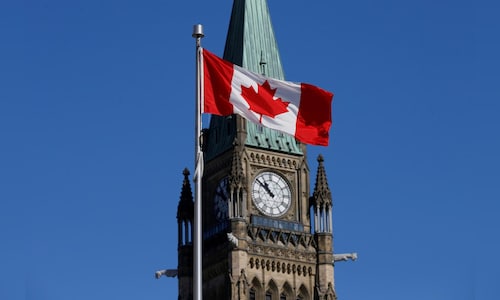“No room left for Mexico or for Canada,” Trump told reporters on Monday when asked if those two countries could reach a deal to delay tariffs. “They’re all set. They go into effect tomorrow.”
Minutes later, Canadian Foreign Minister Melanie Joly said the government in Ottawa is ready to go ahead with the retaliatory duties announced in early February by Prime Minister Justin Trudeau.
Those included an initial set of 25% tariffs on about C$30 billion ($20.6 billion) worth of goods from US exporters — including orange juice, peanut butter, wine and coffee — and a second round on C$125 billion of products, including cars, trucks, steel and aluminum, which would come into effect in a few weeks.
“We know that this is an existential threat to us, and there are thousands of jobs in Canada at stake,” Joly said. “Should the US decide to launch their trade war, we will be ready. We are not looking for this. We’re not seeking this.”
The Canadian dollar and stocks tumbled, with the benchmark S&P/TSX Composite Index falling 1.5%, the most since Dec. 18. Traders in overnight swaps increased bets the Bank of Canada would cut interest rates by 25 basis points at its March 12 meeting, rising to nearly 80% from about a coin flip.
Trump’s executive order, signed Feb. 1, calls for 25% tariffs against most of what the US imports from Canada and Mexico and 10% on Canadian energy products such as crude oil, natural gas and uraniu
The Bank of Canada has warned that a prolonged tariff war has the potential to chop Canadian output by nearly 3% over two years and “wipe out growth” during that period. Demand for Canadian goods in the US would suffer, exporters would cut production and jobs, prices for products imported from the US would rise, and consumers and businesses would spend less.
Trudeau, who’s set to leave office in a matter of days, is returning Monday from a trip to London, where he met with UK Prime Minister Keir Starmer and other leaders.
“Businesses on both sides of the border have already been damaged by the uncertainty coming from President Trump’s drip-drip-drip of tariff threats,” Matthew Holmes, chief of public policy at the Canadian Chamber of Commerce, said in a statement.
“We will have a long road back to Canada and the US being trusted economic partners again. Businesses can’t just switch their whole model to avoid tariffs and then go back again, depending on what politicians decide on any given day,” Holmes said.
Trump’s executive action alleged that Canada allows too much fentanyl to flow over the border. Canadian officials say that’s simply not true — pointing to US government data that shows far less than 1% the illicit opioid that’s seized by US border agents is found at or near the northern crossing.
Still, Trudeau’s government announced a C$1.3 billion plan to beef up border security by adding more aerial surveillance through helicopters and drones. It included a pitch for a new North American joint “strike force” to tackle the fentanyl trade. The prime minister has also appointed a so-called fentanyl czar and increased the number of personnel available to patrol the border, and promised further measures to crack down on organized crime.
Canada’s provinces are also prepared to retaliate against the US.
“A tariff on Canada is a tax on Americans,” Ontario Premier Doug Ford said at a mining convention in Toronto on Monday. “If they’re going to try to annihilate Ontario, I will do everything — including cutting off their energy — with a smile on my face. I’m encouraging every other province to do the same.”
Ontario and other provinces have promised to limit or shut out US companies from government contracts, with Ford reiterating that he would end his province’s contract with Starlink, the Elon Musk-controlled satellite network. And in a new threat, the Ontario premier said he was prepared to cut off nickel exports to the US. “It will shut down manufacturing because 50% of the nickel you use is coming out of Ontario,” the provincial leader said in an interview with NBC News.
Canadian cabinet ministers, provincial premiers and other policymakers have made repeated trips to Washington in recent weeks to talk about the border and to urge US lawmakers and members of Trump’s team not to impose the tariffs.
Joly said government officials have had good conversations with members of the Trump administration. But “there’s a level of unpredictability and chaos that comes out of the Oval Office and we will be dealing with it,” she said.
Immigration Minister Marc Miller said earlier Monday that there’s “no question” tariffs will be painful for the Canadian economy.
“We will have to bring the fight and it will hurt Americans as well. It’s important to reiterate that 35 of those states, their primary trading partner is Canada, so it will hurt them. And we hope the logic will prevail.”


